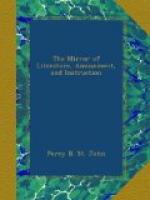* * * * *
NO CHALK.
It appears that the bill for the abolition of imprisonment for debt in America “works well,” as applied to New York; and the system is consequently to be put in general force all over the Union—a fact, which, as a poet like Mr. Watts would say, adds another leaf to America’s laurel. But the paper which announced this gratifying intelligence, relates in a paragraph nearly subjoined to it, a circumstance in natural history that seems to have some connexion with the affairs between debtor and creditor in the United States. It informs us, that up to the present period of scientific investigation, “no chalk has been discovered in North America.” Now this is really a valuable bit of discovery; and we heartily wish that the Geological Society, instead of wasting their resources on anniversary-dinners, as they have lately been doing, would at once set about establishing the proof of a similar absence of that article in this country. Surely, our brethren on the other side of the Atlantic, will not fail to take the hint which nature herself has so benificently thrown out to them; and instead of abolishing the power of getting into prison, put an end at once to the power of getting into debt. The scarcity of chalk ought certainly to be numbered among the natural blessings of America. Had the soil on that side of the ocean been as chalky as this, America might have been visited by a comet, like Pitt, with a golden train of eight hundred millions.—Monthly Magazine.
* * * * *
THE NATURALIST.
ANGLING.
(From the Angler’s Museum, quoted in the Magazine of Natural History.)
Every one who is acquainted with the habits of fish is sensible of the extreme acuteness of their vision, and well knows how easily they are scared by shadows in motion, or even at rest, projected from the bank; and often has the angler to regret the suspension of a successful fly-fishing by the accidental passage of a person along the opposite bank of the stream: yet, by noting the apparently trivial habits of one of nature’s anglers, not only is our difficulty obviated, but our success insured. The heron, guided by a wonderful instinct, preys chiefly in the absence of the sun; fishing in the dusk of the morning and evening, on cloudy days and moonlight nights. But should the river become flooded to discoloration, then does the “long-necked felon” fish indiscriminately in sun and shade; and in a recorded instance of his fishing on a bright day, it is related of him, that, like a skilful angler, he occupied the shore opposite the sun.
* * * * *
SKILFUL ANATOMISTS.
(For the Mirror.)




